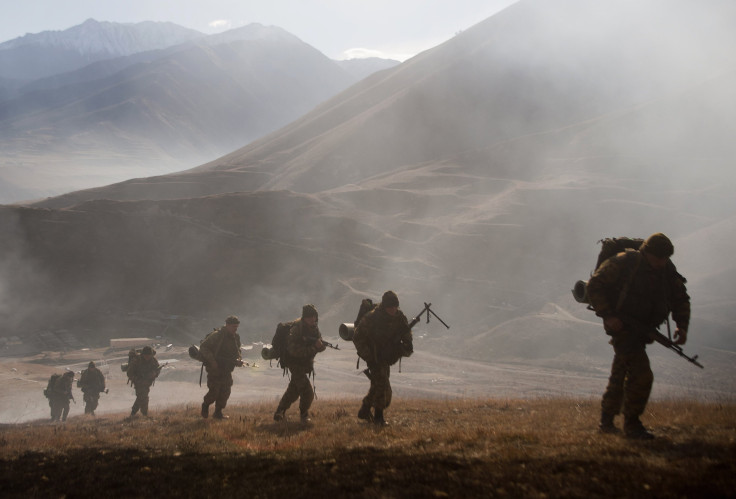Putin Fears Mounting Russian Casualties In Ukraine, Passes Law To Keep Them Secret

When Ukrainian forces withdrew from the city of Debaltseve in February, after one of the fiercest battles in the conflict with Russian separatists, Western media outlets reported that scores of dead and injured Ukrainian soldiers were left on the snowy battlefield, too many for the Ukrainian army to carry as it escaped the city it once controlled. Days later, Ukrainian government officials said that the army had lost 182 men. Pro-Russian rebel commanders reported that they’d lost 60.
According to a recently released report by Russian politician Boris Nemtsov -- who was murdered just steps from the Kremlin earlier this year, when he was still working on the report -- the dead on the pro-Russian side included Russian soldiers too, not just rebels. Yet, across the border that Ukraine shares with Russia, Moscow continued to deny it was involved in the war, covering up the deaths of the Russian soldiers who had been killed while attempting to take the strategic Debaltseve hub. Russian state-controlled media did not talk about Russian victims.
That covering up of Russian casualties has come into sharp focus again Thursday, when president Vladimir Putin revealed new legislation that made information relating to casualties suffered during peacetime a secret -- and Russia is, officially, at peace now, although Western governments allege it is directly involved in Ukraine. That adds to a law passed by President Boris Yeltsin in 1995 that made information on casualties sustained during wartime a secret.
The change in the law follows reports earlier this week that mobile crematoriums are being used to quickly deal with Russian soldiers killed in the contested region of Donbas in eastern Ukraine, ensuring that the bodies of fallen Russians are not seen coming back into Russia and helping to further the Kremlin’s line that it is not involved in the war.
Putin is immensely popular. He enjoys an all-time high approval rating of 86 percent among Russians, according to a poll by the Russia-based independent Levada Center. But the sight of bodies returning home from war could undo that very quickly -- especially from a war that Putin says his army isn't even fighting.
“The issue of casualties is very sensitive domestically in Russia,” said Jeffrey Mankoff, deputy director and fellow with the CSIS Russia and Eurasia Program, an independent think tank based in Washington. The debacle in Afghanistan, where 14,000 Soviet soldier deaths from 1979 to 1989 helped undo the USSR, is a fresh memory for Russian authorities. Russia's wars of the 1990s are an even closer reminder of the negative effects of the pictures of coffins. “If you look back at previous conflicts that Russia and the Soviet Union were involved in, dating back to the 1980s, casualties have played a significant role in undermining public support for the Afghanistan conflict and certainly the first Chechen war, if not the second as well,” Mankoff said.
The casualty rates in those conflicts, said Mankoff, led the general public to not only “question the war but also the government itself.”
And that, he added, is Putin’s big fear.
Survey data compiled by the Levada Center show that a majority of Russians would not support participation in a Ukraine war -- but also that 60 percent of those questioned also don’t believe a war in Ukraine is even happening, and only 25 percent think that Russian soldiers are fighting in Ukraine.
Nemtsov, who was murdered on Feb. 27 while walking to his Moscow home, wanted to get the truth out.
Mikhail Kasyanov, a political ally of Nemtsov and prime minister of Russia from 2000 to 2004, said Nemtsov was killed because his report threatened to reveal the “true story” of Russia’s involvement and the deaths it had sustained.
“What the authorities are afraid of most is Cargo 200,” said Kasynov to the Financial Times in March of this year, using the Russian military term for dead bodies. “And that’s what I know Boris already started to collect [information about] from the Internet, from Russian and Ukrainian sources.”
Nemtsov alleged in his report that Russia had lost 70 men in the battle for Debaltseve and another 150 six months before that.
NATO and European Union leaders have repeatedly said that Russian forces were present in Crimea before the peninsula was annexed in March 2014, and claim that they have been present in eastern Ukraine's Donbas region since the war there began 13 months ago. Consistent and independent reports have placed Russian soldiers and heavy weaponry at the scene of most major battles.
© Copyright IBTimes 2025. All rights reserved.






















